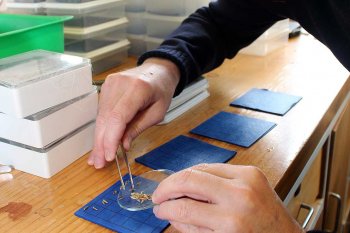
McGill, a research officer at Massey University’s Institute of Agriculture and Environment and leader of the New Zealand Indigenous Flora Seed Bank Project says that for years, New Zealand has experienced a steady decline in the health and diversity of its plant and animal species.
Despite considerable efforts to reverse the decline and protect its indigenous flora and fauna, the country has not been able to halt the downward trajectory of the country’s unique biodiversity. “To overcome this loss, we need to support both ‘in situ’ conservation in the wild and ‘ex situ’ conservation, where species are protected away from their natural locations.
"Seed banking is an ex situ strategy where biodiversity is secured by collecting seed. The seed is collected under strict protocols and then stored at low temperature as insurance against loss in the wild. Seed banks have the advantage of being able to conserve a wide range of species within a relatively small area and at a reasonable cost per species.”
The seed bank he wants to create for New Zealand is much more than a seed collection and storage process inside a single purpose-built facility. McGill says that it offers itself as a platform for research, education, service and resource delivery that puts community and community engagement at the centre of conservation and preservation success.
He adds that New Zealand’s seed bank project will engage with communities, schools, iwi, interest groups and citizens to build a body of knowledge, capability and capacity that allows the programme to turn the stored seeds into plants for use in ecosystem restoration and understand the role seeds play within their habitats and as part of NZ’s natural and cultural heritage.
The project should help to improve the knowledge of when and how to collect, clean and store seeds, and it will provide local and regional seed storage solutions. It will also identify the range of factors required for plants grown from seed to thrive in their natural habitats once restored.
To do this work, McGill wants New Zealanders to embrace citizen science and become custodians that will help to ensure the future continuation of New Zealand’s unique biodiversity.
How every Kiwi can get involved
With the assistance of designers, the seed bank project is developing an ex situ strategy in partnership with research providers, conservation partners, botanical gardens and heritage organisations, as well communities and iwi from locations and regions across New Zealand.
Step One of the process began in 2013 with funding from the Massey University Strategic Innovation Fund and New Zealand Lottery Grants Board. A key science and conservation partnership was created, including Massey University, the Department of Conservation, AgResearch and Landcare Research, the New Zealand Plant Conservation Network and the Royal Botanic Gardens Kew Millennium Seed Bank Partnership.
The partnership has since expanded to include more involvement from New Zealand’s botanic gardens and iwi.
Botanic gardens in New Zealand already contribute to the collecting programme by hosting training workshops for seed collectors and initiating seed collecting expeditions. Botanic gardens also hold many of New Zealand’s threatened species in living collections and, where populations are large enough, seed collected from these plants is being sent to the seed bank.
The next steps are to ensure engagement and sustainable and effective plant preservation and conservation outcomes for New Zealand. This includes the evolution of our knowledge of indigenous flora and fauna, drawing on both matauranga (the body of knowledge generated by Maori about New Zealand, including understandings of place, flora and fauna) and Western science. This work will build on the core role of botanic gardens as education providers that engage with the community to build understanding about the importance of plants in people’s lives and livelihoods.
Botanic gardens in New Zealand have a combined visitor count of over four million visits annually, including visits from school children. They represent a significant form of education outreach and can deliver education programmes linked to the New Zealand school curriculum in partnership with local schools. The education role played by botanic gardens is a significant feature of ex situ conservation and forms a part of their brief to connect the public through citizen science.
The vision is for a decentralised seed bank model that has strong connections with communities, iwi, citizens and regions. This model, supported by storage infrastructure, will offer coordinated research activity, seed storage, information and data sharing, resource and project management tools.
This resource will be used to support community-driven activities and leverage current efforts to grow seed collection capacity, including over 130 recently trained collectors throughout New Zealand. In this way every New Zealander will have the opportunity to play their part in safeguarding the country’s unique biodiversity for generations to come.



 Classifieds
Classifieds

